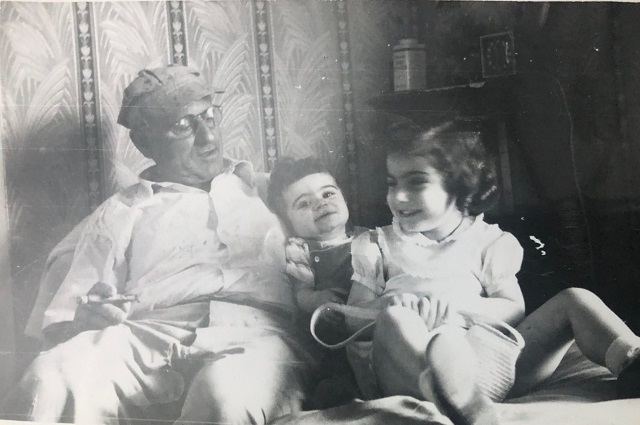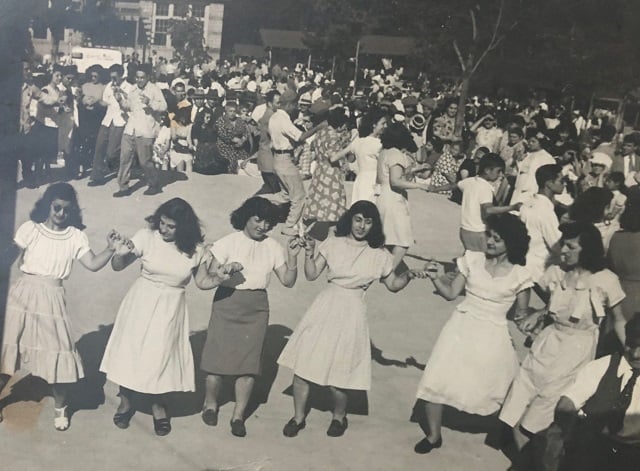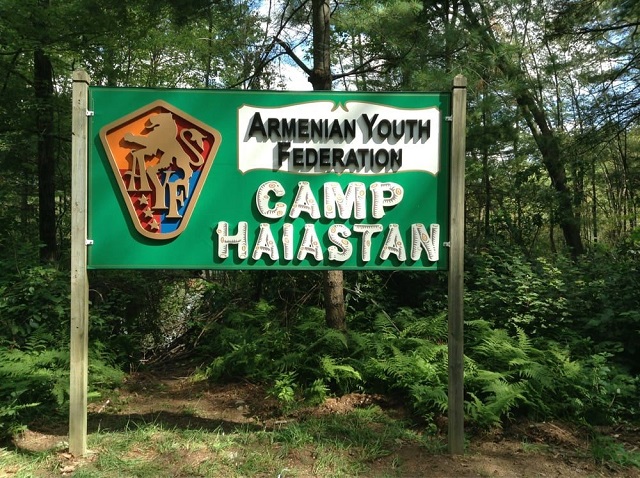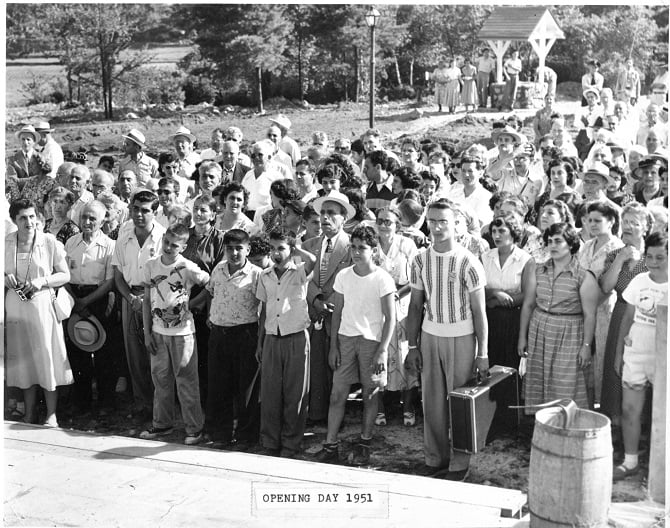The Armenian Weekly. In this year of no summer camps, Franklin is still home to “the best place on earth” as generations have long described Camp Haiastan. What started in 1951 as a novel idea by the first generation of Armenians born in America has become an iconic fixture for decades. Lifelong friendships, first dances and even many marriages have emerged from those hallowed grounds on Uncas Pond. A unique blend of socialization and culture in a rustic environment (it has become much more comfortable with incredible facilities over the years) offers our children a special opportunity to build an Armenian identity with hundreds of other Armenians kids in a safe and exciting environment. The facilities are superb, and the programming is excellent. But what makes Camp Haiastan so attractive is the relationships our kids form. It is here at camp that they build the “dual identity” that Armenian American youth enjoy. They have their American life in their hometowns, and they build a lifelong identity with their fellow Armenians at camp. The geographic diversity makes it unprecedented in their lives. How many 11 or 12 year olds can say they have actual friends (not the kinds on social media) from the midwest, New York or New England? The key to the success of our camp comes from its record of “regeneration.” Campers become CITs, who become counselors and some become teachers or directors. When they become parents, they send their children; many end up serving on the board or committees advocating for a better future.
The process has clearly worked out. Attendance records are broken, and new innovative programs, like teenage sessions and day camps, are instituted. When I was young, our parents sent my three sisters and I to the camp. My older sister went many years as a camper and staff. She met her husband through the camp. My wife and I are proud that our children attended for many years. Driving to camp was always a special experience as we rounded Summer Street to the front entrance. I returned as a volunteer teacher in Armenian history and politics during the Baron Pete administration and experienced such joy in seeing that same excitement on the faces of a succeeding generation.
Unlike most affiliated with Camp Haiastan, going to camp was not my first experience with Franklin. Although I am from the Indian Orchard Armenian community, my second “home” was Franklin. There has been a small Armenian community in this little piece of Armenia since the post-genocide era. After settling in this country my maternal grandmother’s (Turfanda Yergatian Piligian) sisters and brother lived in Franklin. They all lived in the Chestnut Street area within a quarter mile of each other. The one exception was Uncle Setrak’s chicken farm on Route 140 (where the 495 exchange is today) just up the street from Mr. Bedirian’s farm. My grandmother raised her boys in Indian Orchard, and my grandfather worked in the Chapman Valve Foundry. With their two oldest boys returning safely from the war and weary from the conditions of foundry life, they decided to move to Franklin in 1947 and run a chicken farm. It was located on several acres in the middle of the family neighborhood on Chestnut Street. So began what was known as the Piligian Poultry Farm. It was purchased from a family member, and my Uncle Paul was enlisted to move to Franklin ahead of time to learn the business from relatives.

“My sister and I relaxing with Grandpa Stepan with how I remember him…cigar, wire rimmed glasses and farm clothes.”
This was my summer paradise. At the age of six, I started living with my grandparents during the summer months and worked on their chicken farm. I collected eggs, inspected, graded and packed the various sizes in the “egg room” located off the kitchen. I spent precious time with my grandfather in the barns studying his every move and learning the finer points of gardening in his “garden of Eden.” Most of the eggs were sold wholesale, but on weekends we had an egg route in the Boston area. I would ride in the station wagon on Saturdays with my uncle delivering to homes. One of our customers was Curt Gowdy—a former broadcaster for the Boston Red Sox. As my grandfather’s oldest grandson and namesake, I felt a special responsibility which would only grow into my adult years. I adored my grandparents. My grandmother was a strong Armenian woman with clear opinions. I woke each morning very early to the smell of coffee for grandpa. She was always up when I went to bed leading me to ask her when she slept. She would laugh and say, “When you aren’t looking.” My bedroom had a clear view of the bathroom, and I would race there to watch Grandpa lathering his shaving cream from the mug and shave with his straight edge. Sometimes he would brush some cream on me and “shave” with the back side of the razor. Years later I used the same method with my own son. After a morning in the barn, lunch was served under the big “toot” (mulberry) tree. There were always at least half a dozen families for lunch. Under the tree, there was a large granite stone where I used to sit on Grandpa’s lap to listen to his every word. I had several cousins in the neighborhood: Yergatian, Piligian, Torosian and Kamishlian. There were enough of us to play innings of baseball in between egg work. The Torosians had four boys and a girl. Uncle George was also a chicken farmer, and we all played baseball until we were called back to the barns. Egg collections were twice daily, but we always found time to be mischievous and explore the woods, ponds and railroad tracks. Incredible times were had and further supplemented on weekends when other cousins would visit “the farm.” A few times we played pickup games against other kids from Franklin who went to school with my cousins. It was the Armenian cousins versus the kids of Franklin. We always seemed to prevail.
Read also
There were very important Armenian identity experiences in Franklin. In the evenings, my grandfather (who did not drive) would go to the camp to play cards with other local men or those who stayed at the cabins at the top of the camp by the entrance. Some of these folks would come from New York or elsewhere for the summer. My grandfather would ask if I wanted to come with him. Of course, my response was affirmative. Anywhere he went, I was game. During those days, there was an older building for the caretaker where the current house resides. It was there that I would sit in silence for hours watching the intensity of these older men. They would talk politics and recall their days in Western Armenia. If they upset each other, it was quickly forgiven as they embraced at the end of the evening. I will never forget those evenings as I learned about the importance of long term friendships and my special bond with my grandfather. There was an Armenian Relief Society (ARS) chapter or “garmeer khatch” in Franklin. My grandmother was a lifelong member continuing her service after the move to Franklin. A few times a year they would hold dinners with programs. We would always attend driving from our home since these events were held during the school year. The events were held at the Parmenter school cafeteria which was a local Franklin elementary school. My cousins and their parents also attended, and our extended family made up probably half the attendees. We were “excused” from the program part and were supposed to go directly to my cousins, the Kamishlians, who lived directly across the street. The rest of the school was off limits; a custodian was on hand to ensure compliance. Of course, we took this on as a challenge and created havoc in the dark hallways before innocently retreating to the refuge of our cousin’s house.
With summer stays and family holidays, Franklin was endless fun. Summer Sundays were unique. We always attended the picnics at the “upper” camp. When we asked my grandmother on Sundays, “Where are we going today,” she would always respond “Haiastan Camp!” It was in that order the founders would say the name. With the use of English, it evolved to Camp Haiastan. Our Sundays at the camp were memorable. We went to all the picnics because I was “local.” We visited my older sister at the AYF camp, and by the time I became a camper, I was well acquainted with the layout. The picnics were exciting because we were free to roam around the safe “upper” and “lower” confines all afternoon while enjoying the delicious kebab and ice cream from the truck always parked by the main hall. We had the freedom to experience all that Camp offered until 4 pm. That is when my uncles or father would take us back to the farm (only about three miles away) to work the egg sales. My grandfather had a good business selling eggs to picnic attendees who would stop by on their way home. For my grandparents, it was a social experience greeting old friends. For me it was a few hours of shuttling egg crates to the driveway area and an opportunity to watch this marvelous generation live their friendships. At the end of the day, everyone returned home, and I would stay at my second home…the farm.
It was years later that I came to know the remarkable life that my grandparents and their Franklin siblings experienced in their native Koch Hisar and Adana. My grandmother was nine years old when the Adana massacres happened in 1909. She was sent with her siblings to live with relatives in Egypt for two years. She returned to survive the first wave of the Genocide from 1915 to 1917 only to experience the trauma of the Kemalists and French withdrawal in 1920. This strong woman with a deep love of her family was a three-time survivor before she was 20. Grandpa met her as a legionnaire stationed in Adana from 1918 to 1920. These remarkable people and their peers were the people that made Franklin a piece of Armenia for me in my youth. I had my “baseball team” cousins, my first generation relatives, and we all had Camp Haiastan as our Armenian sandbox. Here’s to today’s youth that enjoy our “Haiastan Camp” and a return in 2021.




























































